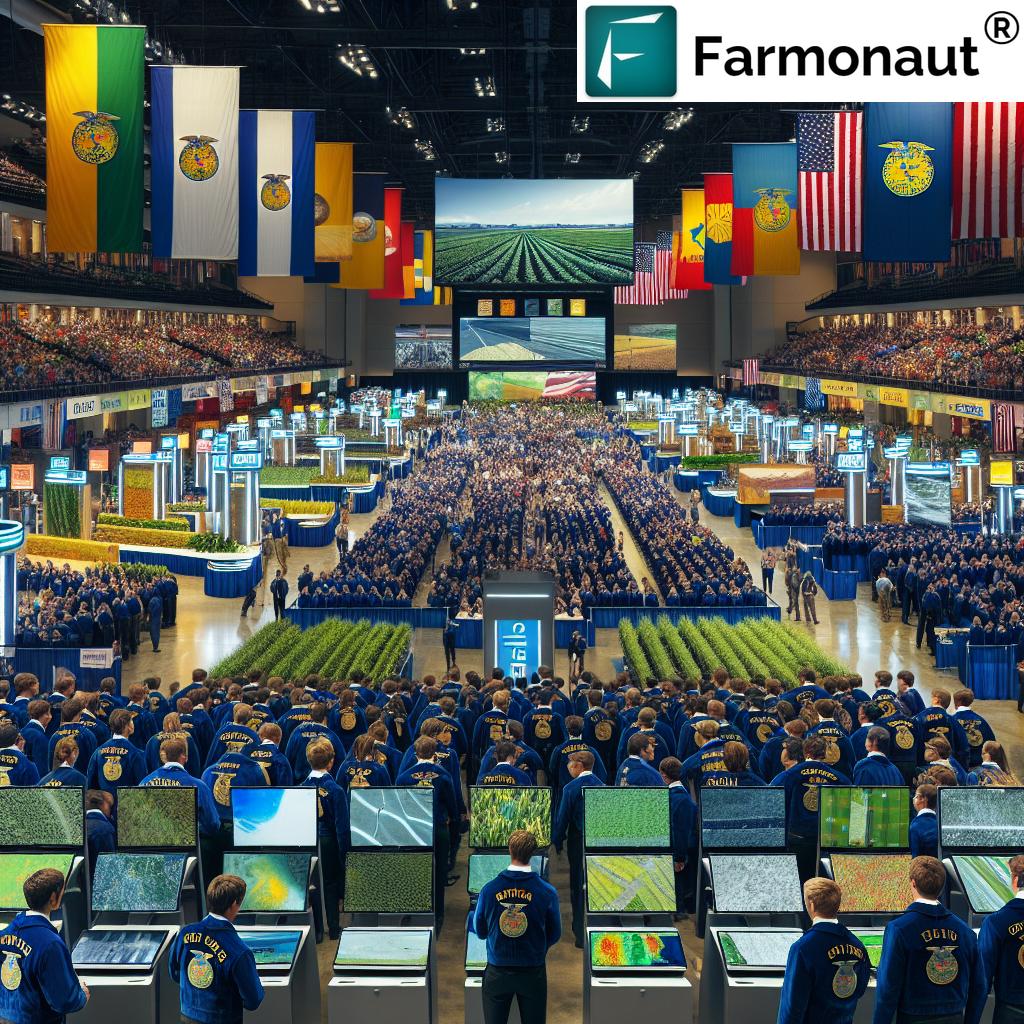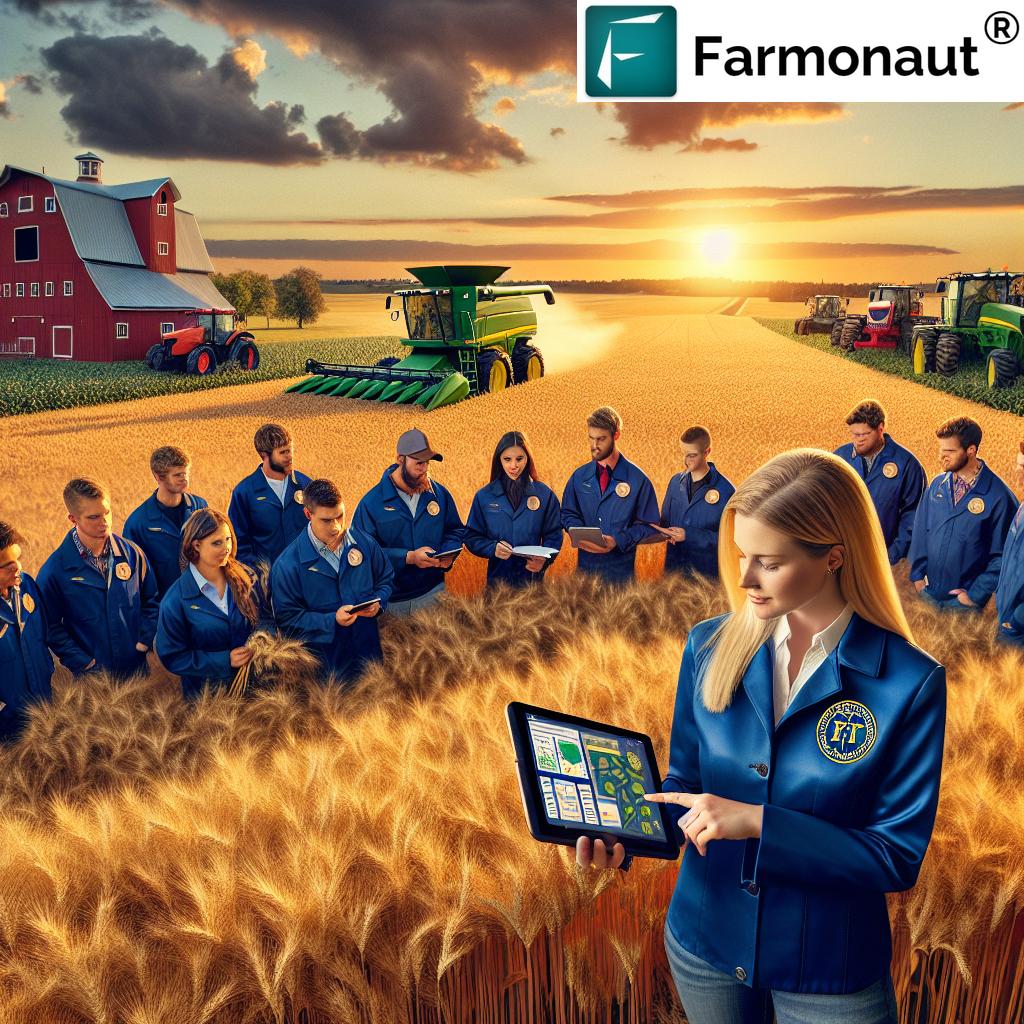Unleashing Agricultural Innovation: How the National FFA Convention Inspires Midwest’s Future Farmers
“The National FFA Convention in Indianapolis attracted over 70,000 members and guests, showcasing the future of farming innovation.”
Welcome to our comprehensive exploration of the National FFA Convention, a beacon of agricultural education and leadership that has ignited the passion of future farmers across the Midwest and beyond. As we delve into this extraordinary event, we’ll uncover how it’s shaping the landscape of modern agriculture, fostering innovation, and inspiring the next generation of agricultural leaders.
The Heart of Agricultural Education: National FFA Convention
The National FFA Convention, held annually in Indianapolis, stands as a testament to the enduring spirit of American agriculture. This year, the event brought together over 70,000 members and guests from across the United States, transforming the city into a vibrant hub of agricultural enthusiasm and innovation.
As we walked through the bustling convention center, we couldn’t help but feel the electric atmosphere. The air was thick with excitement as young minds from various states, including Nebraska and the surrounding Midwest region, gathered to share ideas, learn from industry experts, and showcase their own innovations in farming and livestock management.

Bridging Tradition and Innovation in the Heartland
The convention served as a perfect blend of honoring agricultural traditions while embracing cutting-edge technologies. From the rolling hills of the Midwest to the cattle ranches of the Great Plains, the spirit of innovation was palpable. Attendees from farming communities across the country, including those from states like Nebraska, showcased how they’re integrating precision agriculture techniques with time-honored farming practices.
One of the highlights was the demonstration of crop management technology that’s revolutionizing the way we approach farming in varying terrains and climates. Whether it’s dealing with heavy rainfall in the eastern regions or managing drought-resistant crops in drier areas, the solutions presented were as diverse as the landscape of American agriculture itself.
Inspiring Keynotes: Planting Seeds of Knowledge
The convention featured a series of inspiring keynote speeches that left a lasting impact on attendees. Industry leaders, successful farmers, and agricultural scientists took to the stage, sharing insights that spanned from sustainable farming practices to the latest advancements in agricultural technology.
One particularly memorable speech focused on the importance of adapting to climate change in agriculture. The speaker emphasized how farmers in different regions, from the snow-covered north to the sun-baked south, are implementing innovative techniques to ensure crop resilience and sustainability.
Engaging Activities: More Than Just Talks
The National FFA Convention was far more than just speeches and exhibitions. It was a celebration of agricultural life in all its facets. The event featured:
- Rodeos: Showcasing the skills and traditions of livestock handling
- Talent Shows: Highlighting the diverse talents within the agricultural community
- Hands-on Workshops: Offering practical experience with the latest farming equipment and techniques
- Networking Sessions: Allowing young farmers to connect with industry professionals and peers
These activities not only provided entertainment but also reinforced the sense of community that’s so vital to the agricultural world. They reminded us that farming is not just a profession; it’s a way of life that brings people together.
The Future of Farming: Technology at the Forefront
A significant portion of the convention was dedicated to exploring how technology is reshaping agriculture. From drones for crop monitoring to AI-driven irrigation systems, the future of farming was on full display. This is where companies like Farmonaut come into play, offering innovative solutions that complement the efforts of organizations like the FFA.
Farmonaut’s advanced remote sensing technology is revolutionizing crop management, providing farmers with data-driven insights that can significantly improve yield and sustainability. Explore Farmonaut’s web app to see how it’s transforming modern agriculture.

Sustainable Farming: A Core Focus
Sustainability was a recurring theme throughout the convention. Workshops and exhibitions focused on:
- Soil conservation techniques
- Water management strategies
- Renewable energy integration in farm operations
- Organic farming methods
These sessions emphasized how sustainable practices are not just environmentally responsible but also economically viable in the long run. Farmers from diverse regions, including the Midwest states like Nebraska, shared their experiences in implementing these practices, demonstrating how sustainability can be achieved across different agricultural landscapes.
Recognizing Excellence: Awards and Achievements
One of the most heartwarming aspects of the convention was the recognition of individual and chapter achievements. FFA members from across the country were honored for their outstanding contributions to agriculture and their communities. These awards included:
- American FFA Degree: The highest honor bestowed upon FFA members
- National Chapter Awards: Recognizing outstanding FFA chapters
- Agriscience Fair: Showcasing innovative research projects
- Proficiency Awards: Honoring excellence in specific areas of agricultural study and work
These recognitions not only celebrated individual accomplishments but also inspired other members to strive for excellence in their agricultural pursuits.
The Power of Community Engagement
“FFA chapters continue their civic engagement post-convention, with local fundraising and community service projects impacting thousands of communities nationwide.”
The impact of the National FFA Convention extends far beyond the event itself. FFA chapters across the country, including those in the Midwest states, return to their communities with renewed enthusiasm and innovative ideas. This translates into various community engagement initiatives:
- Local Fundraising: Chapters organize events to support agricultural education and community projects
- Community Service: FFA members participate in local improvement projects, from beautification efforts to food drives
- Educational Outreach: Members share their knowledge with local schools and community groups
- Agricultural Awareness Campaigns: Promoting understanding of modern farming practices and their importance
These activities not only benefit the communities but also provide valuable leadership and organizational experience for the FFA members themselves.
The Role of Technology in Modern Agriculture
As we explore the innovations showcased at the National FFA Convention, it’s crucial to highlight how technology is becoming an integral part of modern farming. This is where solutions like Farmonaut play a significant role.
Farmonaut’s satellite-based farm management solutions are at the forefront of agricultural technology. By leveraging advanced remote sensing and AI, Farmonaut provides farmers with crucial data for informed decision-making. Explore Farmonaut’s API for more insights into their cutting-edge technology.
The integration of such technologies in farming practices aligns perfectly with the FFA’s mission of preparing the next generation of agricultural leaders. It demonstrates how traditional farming wisdom can be enhanced with data-driven insights, leading to more efficient and sustainable agricultural practices.
Bridging the Urban-Rural Divide
One of the most important aspects of the National FFA Convention is its role in bridging the gap between urban and rural communities. By bringing together students from diverse backgrounds, the convention helps to foster understanding and appreciation for agriculture among those who might not have direct exposure to farming.
This cultural exchange is vital for several reasons:
- It helps urban youth understand the importance of agriculture in their daily lives
- It exposes rural students to different perspectives and career opportunities within agriculture
- It creates a network of future leaders who understand both urban and rural needs
- It promotes a more holistic approach to addressing agricultural and environmental challenges
This cross-pollination of ideas and experiences is crucial for the future of agriculture, especially as we face global challenges like food security and climate change.
The Global Perspective: Agriculture Beyond Borders
While the National FFA Convention primarily focuses on American agriculture, it also provides a platform for discussing global agricultural issues. This international perspective is crucial in today’s interconnected world. Attendees learned about:
- Global food security challenges
- International trade and its impact on local farming
- Cross-cultural agricultural practices and innovations
- The role of American agriculture in the global economy
This global outlook prepares FFA members to think beyond their local communities and consider their role in the larger agricultural ecosystem.
The Impact of Climate Change on Agriculture
Climate change and its effects on agriculture were significant topics of discussion at the convention. Farmers from different regions shared their experiences and strategies for adapting to changing weather patterns:
- Midwest: Dealing with increased rainfall and flooding
- Great Plains: Adapting to prolonged droughts and changing growing seasons
- Coastal Regions: Addressing rising sea levels and saltwater intrusion
These discussions highlighted the resilience of the agricultural community and the innovative approaches being developed to ensure food security in the face of environmental challenges.
Empowering the Next Generation of Agricultural Leaders
The National FFA Convention is more than just an annual event; it’s a catalyst for developing the next generation of agricultural leaders. Through various leadership development activities, workshops, and networking opportunities, FFA members are equipped with the skills and knowledge they need to lead the future of agriculture.
Key aspects of leadership development at the convention included:
- Public speaking competitions
- Team-building exercises
- Entrepreneurship workshops
- Career development seminars
These activities not only build confidence and skills but also inspire FFA members to become advocates for agriculture in their communities and beyond.
The Role of Technology in Agricultural Education
As we embrace the digital age, the integration of technology in agricultural education becomes increasingly important. The National FFA Convention showcased various technological tools and platforms that are revolutionizing how agricultural knowledge is shared and applied.
Farmonaut’s innovative solutions play a crucial role in this technological revolution. Their mobile apps for both Android and iOS platforms bring advanced agricultural insights directly to farmers’ fingertips, bridging the gap between traditional farming and modern technology.


The Economic Impact of the National FFA Convention
The National FFA Convention doesn’t just benefit its attendees; it also has a significant economic impact on the host city and surrounding areas. Let’s take a look at some of the economic benefits:
- Boost to local businesses (hotels, restaurants, transportation)
- Increased tourism in the region
- Job creation for event staff and support services
- Showcasing of local agricultural products and innovations
This economic stimulus demonstrates how investing in agricultural education and events can have far-reaching positive effects on local economies.
National FFA Convention Impact at a Glance
| Event Feature | Estimated Impact | Future Implications |
|---|---|---|
| Attendance numbers | Over 70,000 members and guests | Growing interest in agricultural education and careers |
| Keynote speeches highlights | 5-7 major speeches reaching all attendees | Inspiration for new agricultural initiatives and innovations |
| Innovative farming practices showcased | 50+ new technologies and methods presented | Accelerated adoption of precision agriculture techniques |
| Leadership development activities | 100+ workshops and seminars conducted | Enhanced leadership skills in the next generation of farmers |
| Community service projects initiated | 1000+ local projects inspired by the convention | Strengthened ties between FFA chapters and their communities |
Looking to the Future: The Road Ahead for Agriculture
As we reflect on the National FFA Convention, it’s clear that the future of agriculture is bright. The enthusiasm, innovation, and dedication displayed by FFA members from across the country, including the heartland states like Nebraska, paint a picture of an industry that’s not just adapting to change but actively shaping its future.
Key takeaways for the future of agriculture include:
- Increased focus on sustainable and environmentally friendly farming practices
- Greater integration of technology in all aspects of agriculture
- Emphasis on diversity and inclusion in agricultural careers
- Continued importance of community engagement and education
As we move forward, it’s crucial to support initiatives that bridge the gap between traditional farming wisdom and modern technological advancements. This is where solutions like Farmonaut play a vital role, offering tools that empower farmers to make data-driven decisions while respecting time-honored agricultural practices.
Embracing Technology for Agricultural Success
In line with the innovative spirit of the National FFA Convention, it’s important to highlight how technology continues to shape the future of farming. Farmonaut stands at the forefront of this technological revolution in agriculture.
Explore Farmonaut’s comprehensive suite of agricultural technology solutions. Their web app provides a user-friendly interface for accessing powerful farm management tools. Try Farmonaut’s web app to experience the future of precision agriculture firsthand.

Conclusion: Cultivating a Bright Future for Agriculture
The National FFA Convention stands as a testament to the enduring spirit and innovative potential of American agriculture. From the cornfields of Nebraska to the diverse agricultural landscapes across the United States, this event brings together the best and brightest minds in farming, showcasing the incredible potential of our nation’s agricultural future.
As we’ve explored throughout this article, the convention is more than just an annual gathering; it’s a catalyst for change, innovation, and community engagement. It inspires young farmers to embrace new technologies, sustainable practices, and leadership roles, ensuring that agriculture remains a vibrant and crucial part of our national identity.
The future of farming is being shaped by the hands and minds of these young agricultural enthusiasts, supported by cutting-edge technologies and a deep respect for the land. As we look to the horizon, we see a future where traditional farming wisdom blends seamlessly with modern innovations, creating a more sustainable, efficient, and prosperous agricultural sector.
Let’s continue to support and celebrate the efforts of organizations like the FFA and companies like Farmonaut that are working tirelessly to ensure a bright future for agriculture. Together, we can cultivate a world where farming is not just a profession, but a thriving, innovative, and respected cornerstone of our global community.
FAQs
- What is the National FFA Convention?
The National FFA Convention is an annual event that brings together FFA members from across the United States to celebrate agricultural education, leadership, and innovation. - How does the convention impact Midwest agriculture?
The convention showcases innovations and practices particularly relevant to Midwest farming, inspiring local farmers to adopt new technologies and sustainable methods. - What role does technology play in modern agriculture?
Technology, such as Farmonaut’s satellite-based solutions, plays a crucial role in improving crop management, resource efficiency, and overall farm productivity. - How does the FFA contribute to community engagement?
FFA chapters engage in various community service projects and educational initiatives, applying the knowledge and skills gained from events like the National Convention. - What are some key challenges facing modern agriculture?
Modern agriculture faces challenges such as climate change, resource management, and bridging the urban-rural divide, all of which are addressed at the National FFA Convention.



